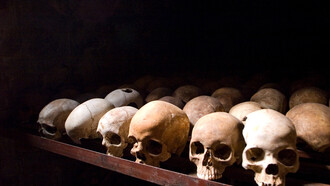In the Christian tradition and calendar, Lent is the period of 40 days before Easter, the time when Christians replicate Jesus Christ’s withdrawal into the wilderness. Lent is marked by fasting from food and other activities. Most critically, however, Lent is a time for self-examination and reflection. Individuals use the Lenten period to reflect upon old habits, to refocus and discover new ways of thinking and engaging in more spiritual practices to deepen one’s spiritual life. Lent represents a time and opportunity for “intentional change.”
The Covid-19 pandemic in America has been a year spent in the “wilderness.” This pause consisting of societal shutdowns, social distancing and quarantining at home has provided the time for a wilderness experience that America has moved through and lived in, many with plenty of time to recall the ideals the nation proudly espouses to the world. America discovered while there in the wilderness that she had to figure out if those ideals were merely statements or actually going to be practiced. America was hit in the face with the chance of correcting those aspects of society that are not representative of American ideals and therefore was faced with making a decision to engage in a process of change and being committed to that change no matter how difficult.
It would have been ideal if America had chosen to go into the wilderness to make the change but having been forced to do so works as well. There is much that we can learn about who we are and what we desire our nation to be by using this forced pause. This time in the wilderness can be realized as constructive if we can emerge from the pandemic renewed, reformed and restored.
This wilderness time involves serious thought and consideration of who we are as a culture and society. How do we as Americans view ourselves and our society really? In the collective American mind, are all citizens who live in the land of freedom able to pursue the American dream of a life of life, liberty, and happiness?
Americans are proud to say, “We hold these truths to be self-evident, that all men are created equal.” Do we believe this? Are all Americans treated fairly and with dignity? Do all Americans have the opportunity to access a good education, economic success, quality health care, political involvement, a fulfilling life and well-being?
In the wilderness of isolation during the pandemic, grave gaps in social and income equality were revealed. Income inequality in the United States is higher than in any other developed country. Already a defining challenge, it threatens to become deeper as a result of the pandemic. In the wilderness of national reflection, we are brought face to face with those who toil but do not receive a livable wage; too many live in poverty, experience epidemic food insecurity, are unable to access health care, and are pushed into homelessness. Social inequality, deeply connected to income inequality, is revealed in issues of incarceration, violence, substance abuse, mental health and the persistent attempts to deny all citizens access to the political process.
America is still in the wilderness. Will its citizens discern between truth and error, espoused ideals and reality? Will clarity of what must change be obvious? Will we acknowledge the contractions between America’s stated ideals and the reality of life for many of its citizens -- the hypocrisy related to “all” people being equal when we consider the impact of race and poverty in our society?
Upon leaving the wilderness, will Americans as individuals in the collective make a commitment to accept the challenge of honesty? Can we live comfortably and satisfied with what the pandemic has revealed about the lives of too many of our citizens? We must ask if our belief system and values are consistent with our democratic ideals. Will we ever take heed and rid ourselves of beliefs and stereotypes held in the collective American mind that regard some of our citizens as undeserving of the rights and privileges promised?















